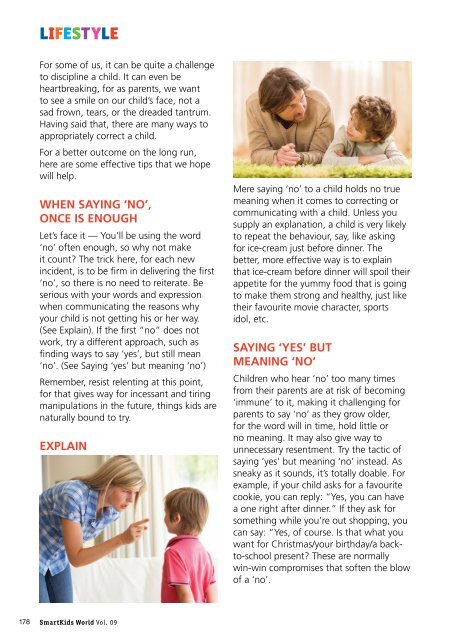SKW ENG V09
You also want an ePaper? Increase the reach of your titles
YUMPU automatically turns print PDFs into web optimized ePapers that Google loves.
LIFESTYLE<br />
For some of us, it can be quite a challenge<br />
to discipline a child. It can even be<br />
heartbreaking, for as parents, we want<br />
to see a smile on our child’s face, not a<br />
sad frown, tears, or the dreaded tantrum.<br />
Having said that, there are many ways to<br />
appropriately correct a child.<br />
For a better outcome on the long run,<br />
here are some effective tips that we hope<br />
will help.<br />
When saying ‘no’,<br />
once is enough<br />
Let’s face it — You’ll be using the word<br />
‘no’ often enough, so why not make<br />
it count? The trick here, for each new<br />
incident, is to be firm in delivering the first<br />
‘no’, so there is no need to reiterate. Be<br />
serious with your words and expression<br />
when communicating the reasons why<br />
your child is not getting his or her way.<br />
(See Explain). If the first “no” does not<br />
work, try a different approach, such as<br />
finding ways to say ‘yes’, but still mean<br />
‘no’. (See Saying ‘yes’ but meaning ‘no’)<br />
Remember, resist relenting at this point,<br />
for that gives way for incessant and tiring<br />
manipulations in the future, things kids are<br />
naturally bound to try.<br />
Explain<br />
Mere saying ‘no’ to a child holds no true<br />
meaning when it comes to correcting or<br />
communicating with a child. Unless you<br />
supply an explanation, a child is very likely<br />
to repeat the behaviour, say, like asking<br />
for ice-cream just before dinner. The<br />
better, more effective way is to explain<br />
that ice-cream before dinner will spoil their<br />
appetite for the yummy food that is going<br />
to make them strong and healthy, just like<br />
their favourite movie character, sports<br />
idol, etc.<br />
Saying ‘yes’ but<br />
meaning ‘no’<br />
Children who hear ‘no’ too many times<br />
from their parents are at risk of becoming<br />
‘immune’ to it, making it challenging for<br />
parents to say ‘no’ as they grow older,<br />
for the word will in time, hold little or<br />
no meaning. It may also give way to<br />
unnecessary resentment. Try the tactic of<br />
saying ‘yes’ but meaning ‘no’ instead. As<br />
sneaky as it sounds, it’s totally doable. For<br />
example, if your child asks for a favourite<br />
cookie, you can reply: “Yes, you can have<br />
a one right after dinner.” If they ask for<br />
something while you’re out shopping, you<br />
can say: “Yes, of course. Is that what you<br />
want for Christmas/your birthday/a backto-school<br />
present? These are normally<br />
win-win compromises that soften the blow<br />
of a ‘no’.<br />
178<br />
SmartKids World Vol. 09

















